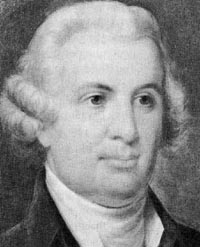William Hooper was a North Carolina delegate to the Continental Congress, a signer of the Declaration of Independence, and a lawyer.
Early Life & Education

William Hooper was a signer of the Declaration of Independence
Public domain image.
William Hooper was born on June 28, 1742 in Boston, Massachusetts. William’s father was a well respected minister and he planned for his son to follow in his footsteps when he was old enough. With this in mind, William was educated at Boston’s Latin school under one of the most well-respected teachers in Boston: Mr. John Lovell.
When William Hooper was fifteen, he studied at Harvard University, where he excelled. In 1760, Hooper graduated with a bachelor’s degree in art. Much to his father’s disappointment, William decided not to be a minister, and chose to study law instead.
James Otis took Hooper on as an apprentice and started to teach him law. After passing the foo in 1764, Hooper moved to North Carolina, because there were too many lawyers in Boston already. He began his career as the circuit court lawyer of Cape Fear.
In 1767, Hooper took Anne Clark as his wife. The union was a good one because of Hooper’s growing status there already, Anne’s position as the daughter of a wealthy family (and her father being the Sheriff) only increased his good reputation.
Revolution
When Hooper first began to involve himself in the dispute with Britain, he was labelled a Loyalist. However, as time went on, he lost favor with the loyalist crowd and soon found himself among the patriots.
It was not long before William Hooper was sent to the Committee of Correspondence. Then in 1774, he was sent as a delegate to the First Continental Congress. The following year, he was sent to the Second Continental Congress.
On July 4, 1776, Hooper was away working in North Carolina and thus missed the voting on the Declaration of independence. However, when he heard of its approval, he arrived in time to sign it.
During the Revolutionary War, William Hooper’s estates were captured by the British and he was forced to rely on other Americans to feed him and shelter him. During this time, Wiliam was separated from his wife and children and did not even know if they were dead or alive.
After a year of living like this, Hooper finally found out that his family had settled in Hillsborough, North Carolina, where he was finally reunited with them. In Hillsborough, he went back to serving on the North Carolina assembly.
Final Years
After the war had ended, Hooper returned to serving as a politician and a lawyer. He served in public roles until his death on October 14, 1790.


